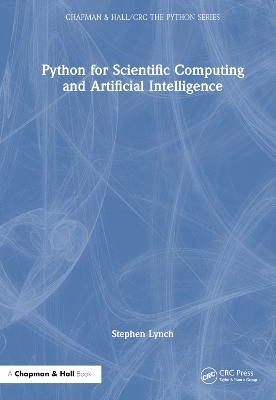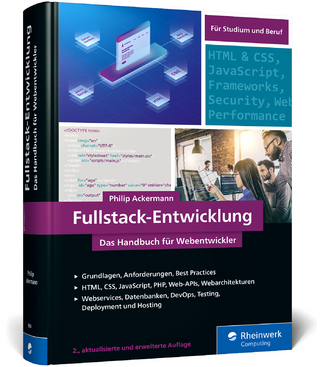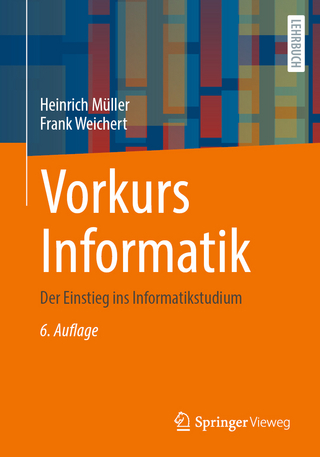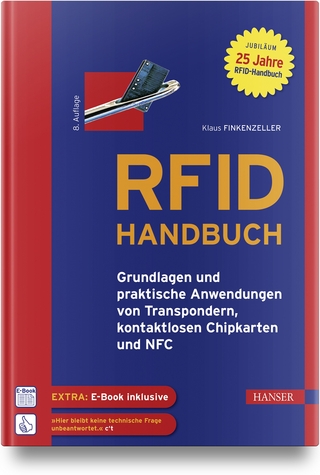
Python for Scientific Computing and Artificial Intelligence
Chapman & Hall/CRC (Verlag)
978-1-032-25873-7 (ISBN)
This book was developed from a series of national and international workshops that the author has been delivering for over twenty years. The book is beginner friendly and has a strong practical emphasis on programming and computational modelling.
Features:
No prior experience of programming is required
Online GitHub repository available with codes for readers to practice
Covers applications and examples from biology, chemistry, computer science, data science, electrical and mechanical engineering, economics, mathematics, physics, statistics and binary oscillator computing
Full solutions to exercises are available as Jupyter notebooks on the Web
Support Material
GitHub Repository of Python Files and Notebooks: https://github.com/proflynch/CRC-Press/
Solutions to All Exercises:
Section 1: An Introduction to Python: https://drstephenlynch.github.io/webpages/Solutions_Section_1.html
Section 2: Python for Scientific Computing: https://drstephenlynch.github.io/webpages/Solutions_Section_2.html
Section 3: Artificial Intelligence: https://drstephenlynch.github.io/webpages/Solutions_Section_3.html
In 2022, Stephen Lynch was named a National Teaching Fellow, which celebrates and recognises individuals who have made an outstanding impact on student outcomes and teaching in higher education. He won the award for his work in programming in the STEM subjects, research feeding into teaching, and widening participation (using experiential and object-based learning). Although educated as a pure mathematician, Stephen’s many interests now include applied mathematics, cell biology, electrical engineering, computing, neural networks, nonlinear optics and binary oscillator computing, which he co-invented with a colleague. He has authored 2 international patents for inventions, 8 books, 4 book chapters, over 40 journal articles, and a few conference proceedings. Stephen is a Fellow of the Institute of Mathematics and Its Applications (FIMA) and a Senior Fellow of the Higher Education Academy (SFHEA). He is currently a Reader with MMU and was an Associate Lecturer with the Open University from 2008-2012. In 2010, Stephen volunteered as a STEM Ambassador, in 2012, he was awarded MMU Public Engagement Champion status, and in 2014 he became a Speaker for Schools. He runs national workshops on "Python for A-Level Mathematics and Beyond," and international workshops on "Python for Scientific Computing and TensorFlow for Artificial Intelligence." He has run workshops in China, Malaysia, Singapore, and the USA.
Section I. An Introduction to Python. 1. The IDLE Integrated Development Learning Environment. 2. Anaconda, Spyder and the Libraries NumPy, Matplotlib and SymPy. 3. Jupyter Notebooks and Google Colab. 4. Python for AS-Level (High School) Mathematics. 5. Python for A-Level (High School) Mathematics. Section II. Python for Scientific Computing. 6. Biology. 7. Chemistry. 8. Data Science. 9. Economics. 10. Engineering. 11. Fractals and Multifractals. 12. Image Processing. 13. Numerical Methods for Ordinary and Partial Differential Equations. 14. Physics. 15. Statistics. Section III. Artificial Intelligence. 16. Brain Inspired Computing. 17. Neural Networks and Neurodynamics. 18. TensorFlow and Keras. 19. Recurrent Neural Networks. 20. Convolutional Neural Networks, TensorBoard, and Further Reading. 21. Answers and Hints to Exercises.
| Erscheinungsdatum | 11.07.2023 |
|---|---|
| Reihe/Serie | Chapman & Hall/CRC The Python Series |
| Zusatzinfo | 9 Tables, black and white; 155 Line drawings, color; 155 Illustrations, color |
| Sprache | englisch |
| Maße | 178 x 254 mm |
| Gewicht | 1300 g |
| Themenwelt | Mathematik / Informatik ► Informatik ► Programmiersprachen / -werkzeuge |
| Mathematik / Informatik ► Informatik ► Software Entwicklung | |
| Technik ► Elektrotechnik / Energietechnik | |
| Technik ► Umwelttechnik / Biotechnologie | |
| ISBN-10 | 1-032-25873-X / 103225873X |
| ISBN-13 | 978-1-032-25873-7 / 9781032258737 |
| Zustand | Neuware |
| Informationen gemäß Produktsicherheitsverordnung (GPSR) | |
| Haben Sie eine Frage zum Produkt? |
aus dem Bereich


